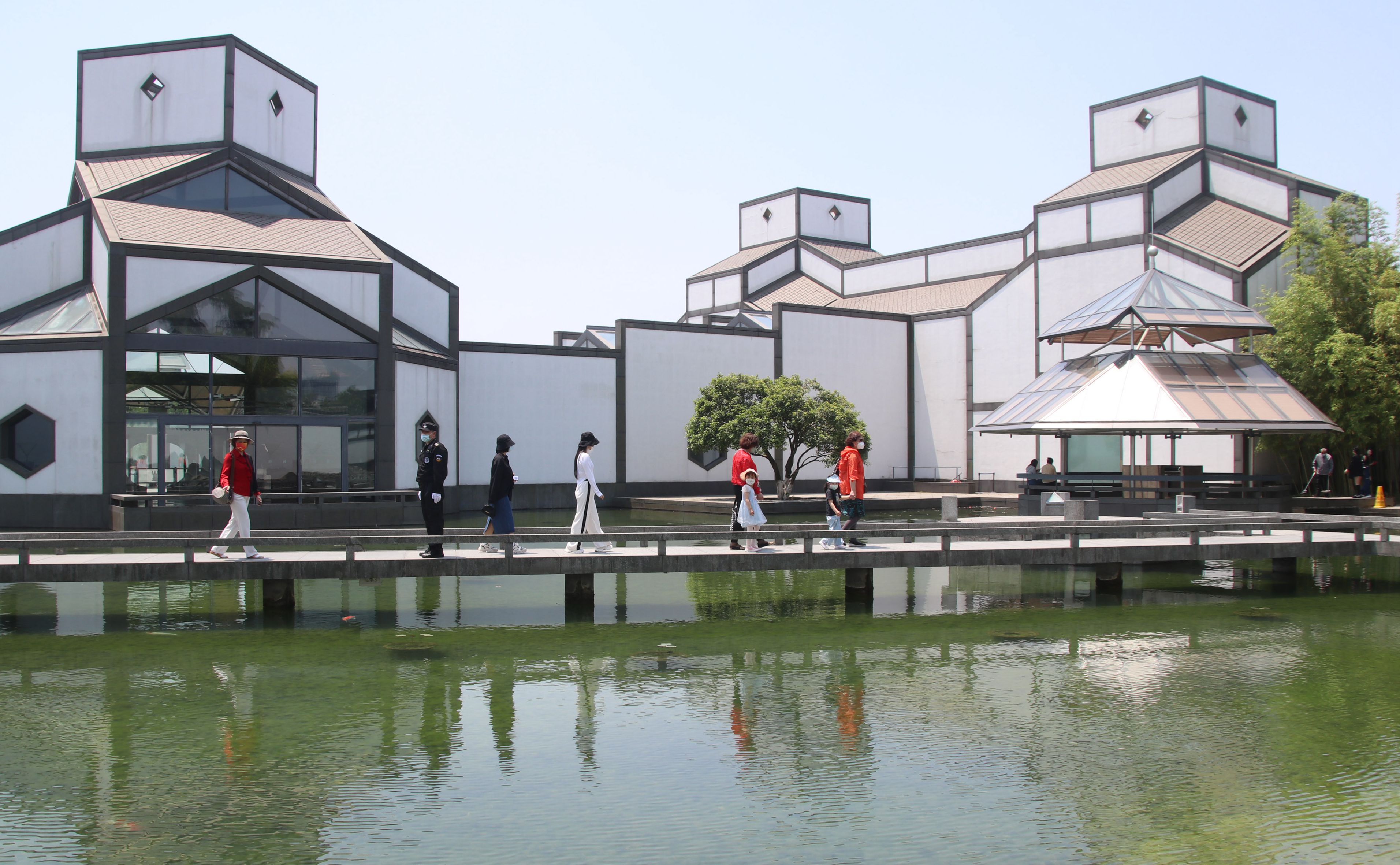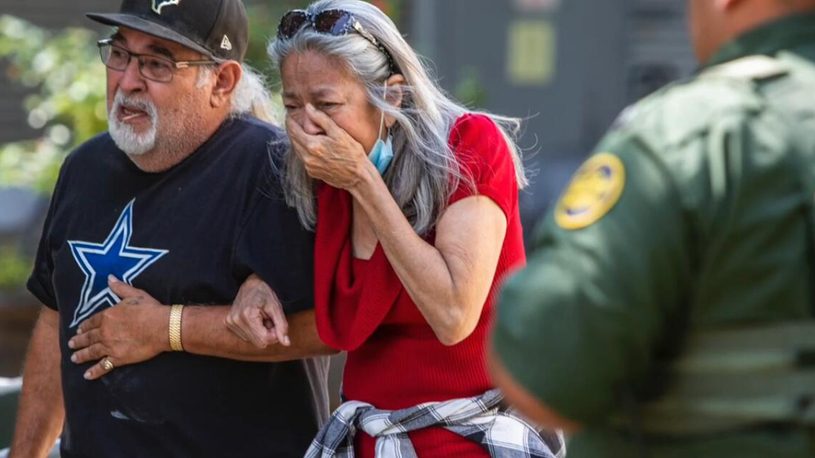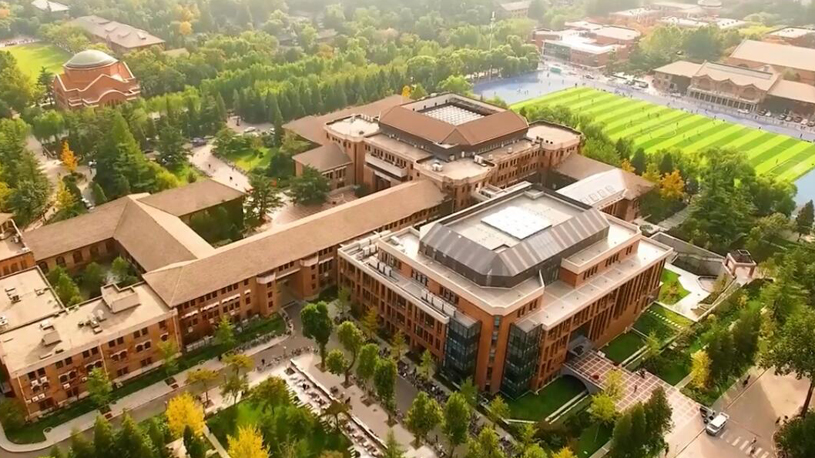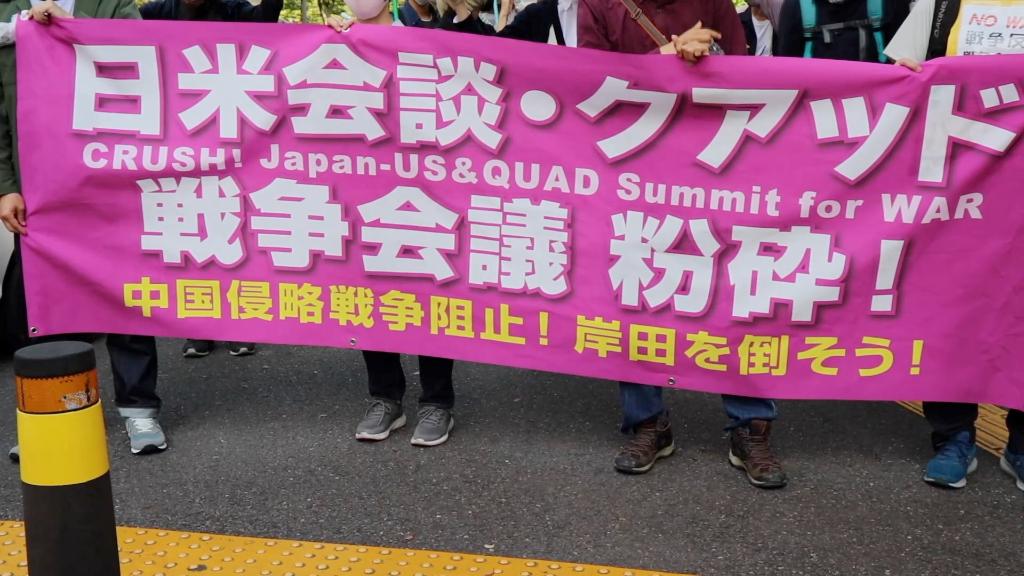* The death of African American man George Floyd two years ago added a reprehensible chapter into America's ill-famed human rights record.
* Two years on, the country continues to reel from controversial police killings of African Americans.
* Partisan chasm, ideological divisions and economic inequality are still exacerbating racial issues in the United States.
by Xinhua writer Sun Ding
MINNEAPOLIS, United States, May 25 (Xinhua) -- The death of African American man George Floyd under the knee of a white police officer here two years ago added a reprehensible chapter into America's ill-famed human rights record.
Two years on, the United States continues to reel from the terrifying murder that occurred in broad daylight. At the same time, it struggles to find a cure for racism long embedded in the nation's political, economic, and social fabric.
More worrisome is the fact that partisan chasm, ideological divisions and economic inequality are still exacerbating racial issues, further heightening rather than dulling a sense of breathlessness among African Americans and other minorities.
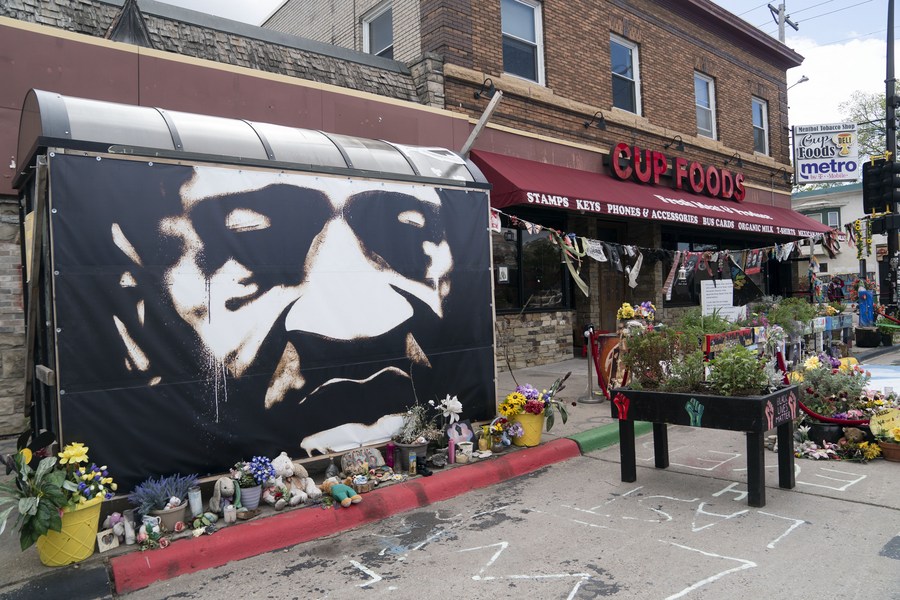
Photo taken on May 22, 2022 shows the George Floyd Square in Minneapolis, Minnesota, the United States. (Xinhua/Liu Jie)
"I CAN'T BREATHE"
On May 25, 2020, Floyd was arrested on a street corner of Minneapolis, Minnesota by four police officers after a convenience store employee called 911 and reported that the 46-year-old man had used a counterfeit bill to buy cigarettes.
One of the responding cops -- white male Derek Chauvin -- had his knee on Floyd's neck for more than nine minutes during the arrest. The tall African American man pleaded "I can't breathe" multiple times before losing consciousness. Medics arrived very shortly and loaded the motionless man into an ambulance, who was pronounced dead later.
"I lost words. There was numbness. I don't know if it was shocking in denial because nothing made sense to me," Floyd's aunt Angela Harrelson described the feeling of learning about her nephew's killing to Xinhua while standing at the site of the deadly encounter, now commonly called "George Floyd Square" -- a gathering place for people to pay their respects and remember him.
"There was no preparation," said Harrelson, who referred to Floyd as his middle name Perry, adding that she was "thrust into the moment to deal with grief, to deal with pain through the emotional rollercoaster."
Kevin Brown, a local resident and African American who witnessed part of Floyd's arrest, told Xinhua that "it just takes the air out of you" when seeing "how graphic it was."
Many other Americans also felt irritated and took to the streets to protest against police brutality and racism throughout the summer of 2020. A flurry of cities -- including Washington, D.C. -- imposed curfews and activated National Guard members in response to the unrest and violence over which politicians on different sides blamed each other.
Medical examiners have concluded the cause of Floyd's death was "cardiopulmonary arrest complicating law enforcement subdual restraint and neck compression." All four involved Minneapolis officers were fired and have been found guilty on different charges, and Chauvin is serving a sentence of 22 years and six months in prison after being convicted of murdering the man.
A recently-released biography of Floyd authored by Washington Post reporter Robert Samuels and his colleague Toluse Olorunnipa revealed how systemic racism in the United States shaped the man's life and legacy -- "from his family's roots in the tobacco fields of North Carolina, to ongoing inequality in housing, education, health care, criminal justice, and policing," according to the book's publisher.
"One thing that we wanted folks to understand when they read the book is that the institutional hardships and barriers that were presented to George Floyd could have happened to almost any Black man living in America," Samuels said. "And that's one of the terrifying things about it."
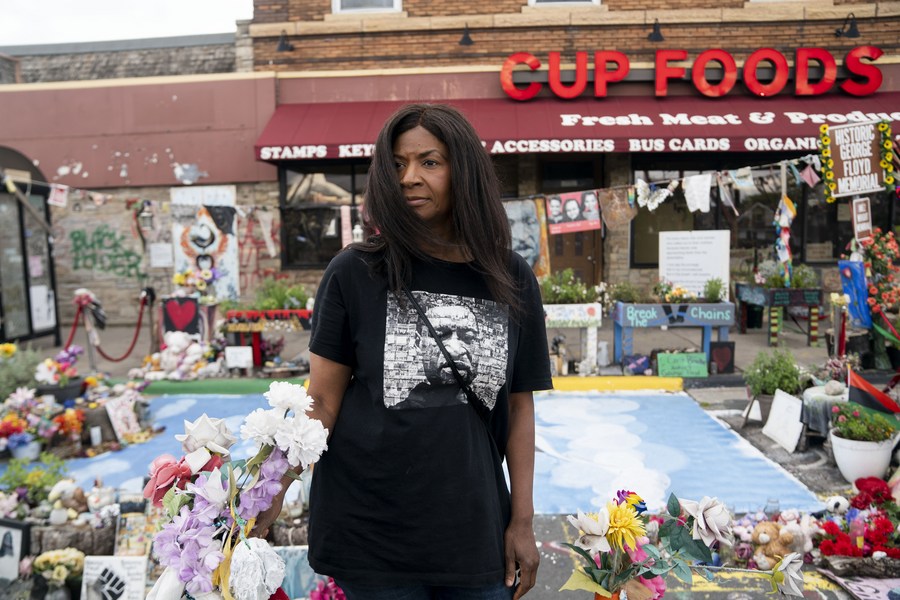
Floyd's aunt Angela Harrelson stands on the George Floyd Square in Minneapolis, Minnesota, the United States, May 22, 2022. (Xinhua/Liu Jie)
MORE VICTIMS
In the aftermath of Floyd's death, there was a renewed push to reform policing in the United States. However, the ugly scar of racism hasn't healed over the past two years. Instead, it has grown more painful with more controversial police killings of African Americans.
Amir Locke, 22, was fatally shot by Minneapolis police executing a "no-knock" search warrant as part of a homicide investigation in an early February morning this year. Body camera footage shows a gun in Locke's hand -- which he legally possessed -- as he was abruptly awakened and emerged from a couch.
Locke was not a suspect in the crime for which the warrant was issued and was not named at all in the document but prosecutors declined to file charges against the officer who took his life, alleging that the young African American man's reaction constituted a "specifically articulable threat." Civil rights activists have argued Locke was acting in self-defense.
According to Mapping Police Violence -- an initiative that reports data pertaining to U.S. police violence, African Americans were more than 20 percent of those killed by police in 2021 despite being only 13 percent of the total population, meaning that they are nearly three times as likely to be killed by cops as white people in the United States. "The act of police brutality wasn't something new," a Minneapolis community volunteer named Phi told Xinhua.
Minneapolis artist and activist Mari Mansfield painted a mural called Mourning Passage on the surface of a road section near George Floyd Square, which consisted of "the names of 169 people of color killed by police" in the United States, with Floyd's name at the top of the artwork.
"You can say one name or a few names but when you actually write it down it's a lot more people than you think," Mansfield told Xinhua as she instructed volunteers to repaint the names to mark the second anniversary of Floyd's death. "I have a waitlist of a lot of names. This list will never be done. It will never be finished. There will always be someone left off."
"America had been slowly killing George Floyd for decades before Derek Chauvin pressed the last breath out of him," wrote Imbolo Mbue, a Cameroonian-American novelist and short-story writer based in New York City, in an article recently published in The Atlantic.
"Fair enough, but deep down I know, many of us know, that even with Chauvin in prison, justice has not been fully served," Mbue lamented. "Those entities that created the conditions for Floyd's death carry on. They thrive. Their next victim awaits."
ORIGINAL SIN
Throughout the 17th and 18th centuries, millions of people were kidnapped from Africa and forced into slavery in the American colonies for the production of cash crops such as tobacco and cotton.
By the mid-19th century, an entangling of the Westward Expansion and an abolition movement in the United States provoked fierce debates over slavery that would divide the young nation in the bloody Civil War. Though the Union victory freed the nation's 4 million enslaved people, the negative legacy of slavery has stayed alive.
Having had more than enough of prejudice and violence, African Americans launched a struggle for social justice as part of a civil rights movement in the mid-20th century, leading to the United State passing a series of major legislation, including the Civil Rights Act of 1964 -- which legally ended the segregation that had been institutionalized by Jim Crow laws.
"No one should have a membership to equality. Equality is a birthright. It's not an option," Harrelson pointed out. "For 400 years it has been an option for brown and black people. You had to negotiate equality -- the right to ride the bus, the right to vote, the right to be educated. Those things were illegal for us."
Despite the civil rights laws, the African American community has continued to suffer from racism in the United States over the past decades. A Gallup poll in 2021 found that there is still as much as 64 percent of adults in the United States who believe that racism against African Americans is widespread in the nation.
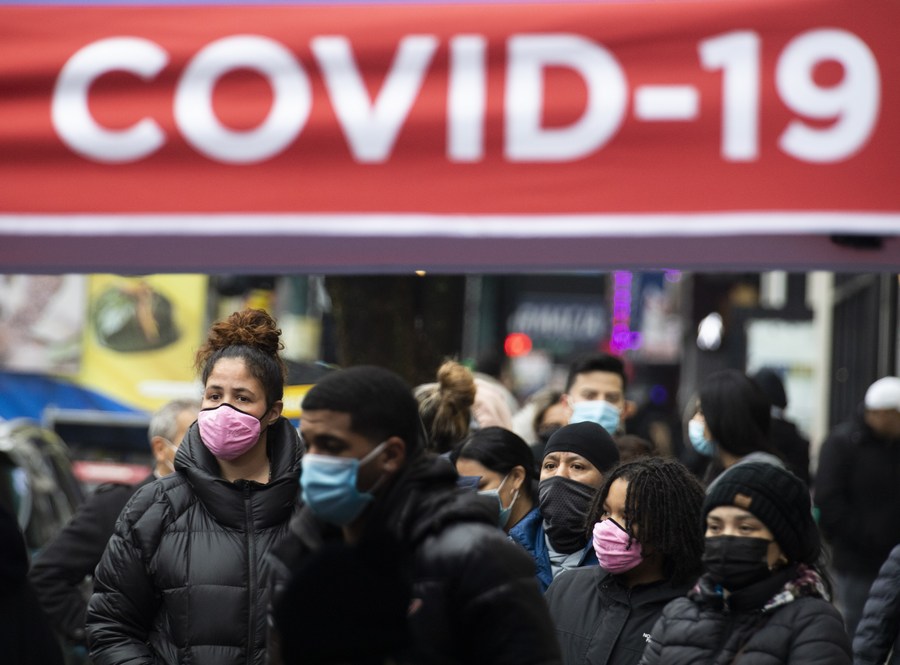
People wait for COVID-19 testing in the Queens borough of New York, the United States, Dec. 29, 2021. (Xinhua/Wang Ying)
The ongoing COVID-19 pandemic has further aggravated the predicament of African Americans. Less likely to be insured and receive treatment, they have had higher infection and death rates than their white counterparts. As a result, African Americans experienced a staggering 2.9-year downturn in life expectancy compared to 1.2 years for white people, according to a study issued by the Brookings Institution, a Washington, D.C.-based think tank.
"For us, Floyd's death was a gut punch -- a vivid realization that it could have been me or my husband or wife, my daughter or son, my cousin or uncle," Ben Crump, an African American lawyer who specializes in civil rights, wrote in a recent opinion for The Washington Post.
"It was deeply personal, because every Black American knows we share a common and constant vulnerability," Crump acknowledged. "That's why Floyd's dying words -- 'I can't breathe' -- spoke for us all." (Video reporters: Sun Ding, Liu Jie, Hu Yousong; video editors: Chen Sihong, Wei Yin)■




